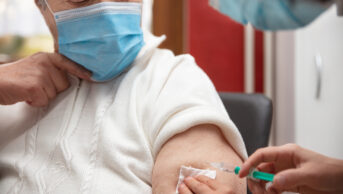
Shutterstock.com
In July 2022, I attended a summer school on the impact of COVID-19 on European health and wellbeing, hosted by Universiteit Leiden, The Hague, the Netherlands. The programme was organised by the European University for Well-Being (known as ‘EUniWell’), an alliance of ten universities across Europe that have a shared aim of understanding, rebalancing and improving wellbeing across the continent.
One of the biggest threats to wellbeing in recent years has been the COVID-19 pandemic. The main reason I attended the course was because the pandemic led to vast changes both in work and personal life for many people. It has had both a positive and negative impact on the way we manage and look after patients, with many changes becoming the new norm. I set out to understand in more detail the impact of the pandemic on the healthcare system we work within and use. I also wanted to better understand the overall impact on younger people and healthcare workers so that, as a future pharmacy leader, I can learn from this period and recognise how best to look after and manage during difficult situations.
COVID-19 management across Europe
We are all too familiar with the pandemic response within the UK and the lessons learnt from it. There were various differing approaches to the pandemic across the continent, with social distancing and lockdowns in the UK, to more relaxed guidelines and herd immunity approaches adapted in countries such as Sweden.
Nevertheless, during the EUniWell programme there were several learning points shared that were new to me. These included collaborative working with religious leaders of specific communities, which was essential for the successful roll-out of COVID management strategies and the vaccination programme, as well as the consideration of the overall financial toll that adhering to government guidance can have on an individual. This includes welfare support to aid compliance with measures taken to tackle COVID-19, such as management of the financial loss suffered by a person because of having to self-isolate.
Tackling COVID-19 using an app
Throughout the pandemic there was a strong utilisation of telemedicine, with virtual consultations becoming the norm for service users. The use of e-applications is something that was utilised successfully throughout Europe, but most notably in the Netherlands with the development of the ‘COVID Radar’ app. The app was developed to track symptom development within the population but also highlighted trends of increasing cases from a geographical context. It also offered the added advantage of reaching younger users, with the appropriate use of social media, and uncovered new issues with e-health applications, such as accessibility for users with low literacy levels and those with impaired vision. The app helped to detect COVID hotspots and the significance of social transmission, most notably with regards to public holidays and large group gatherings.
The widest and significant overarching theme was the extensive impact on mental health and wellbeing
Another area where e-health application excelled was in the research of long-COVID. The ‘Therapies for long-COVID in non-hospitalised individuals’ (TLC) study, published in The BMJ in April 2022, developed an app-based symptom burden questionnaire for those with a positive COVID test. The study was carried out in collaboration with patient partners and was the largest of its type within primary care. The questionnaire responses have helped to identify risk factors of long-COVID, such as female gender, socioeconomic deprivation and — interestingly — lower age.
Impact of COVID-19
Young people were adversely affected by the COVID pandemic in various ways. The abrupt termination of in-person teaching and the shift to distance learning had a profound and negative impact on students throughout Europe. This was also felt to a greater extent to those from disadvantaged socio-economic backgrounds with issues around technology and parental support. This is a specific concern with regards to preregistration pharmacists — the uncertainty of their training year, combined with wider changes to their working environment, led to anxiety and apprehension. It is essential that we learn from these shortcomings and build them into our training for leadership and management. This is something I am attempting to continue on returning from this experience, whereby I am developing my understanding of compassionate leadership and coaching skills through use of the NHS Leadership Academy. This is a free resource that I recommend all pharmacists should utilise, given that we all have leadership functions to some extent within our day-to-day roles.
Another population undoubtedly adversely affected by the pandemic was healthcare workers. The ‘COPE West Midlands’ study helped to identify how occupational exposures increased the risk of COVID-19 in this group. Another consequence of a higher COVID-19 infection rate in healthcare workers was the subsequent contact with household members who then contracted the virus. The study also identified common themes, such as staff not feeling protected during the initial first wave, with PPE supply issues and inconsistent guidance at both an internal and government level. Staff also noted the positives of testing availability if they displayed symptoms. However, the widest and significant overarching theme was the extensive impact on mental health and wellbeing. This was a combination of uncertainty, morally challenging times, social isolations and limited coping strategies available during lockdown periods.
Lessons learnt
All in all, the summer school helped consolidate what I had experienced myself during the pandemic, while also giving me a more international perspective of its impact. The importance of socio-economic deprivation is something that is not limited to COVID-19 and has an influence on a range of non-communicable disease states; the pandemic itself has placed a spotlight on this issue.
It has also led to advancements in telemedicine and has accelerated the use of e-applications to influence the healthcare arena positively. However, the most important learning point was the pandemic’s impact on wellbeing and the negative effect it has had on mental health of individuals of all ages, with a particular focus on those at the forefront, such as healthcare workers.
There was also much positivity gained from meeting other healthcare professionals and pharmacists across Europe. The shared learning and new viewpoints gained served as a big influence on my own practice upon my return. I would very much advocate this for my colleagues within the UK and believe that through mutual working in this way — especially during periods of uncertainty such as the pandemic — our overall decision making will be vastly improved.
One of my goals upon my return from the summer school is to develop an exchange programme for pharmacy students within the UK in alliance with the attending institutions in the EUniWell arena.
Shane Kailla, advanced clinical practice student (MSc DA)


